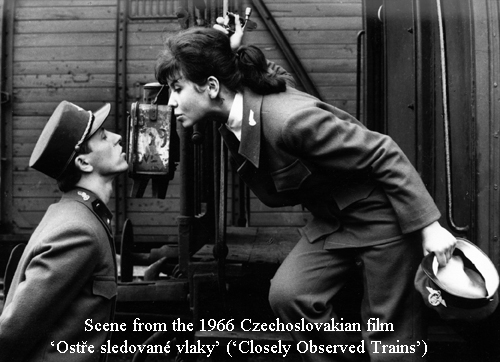Finished the novel ‘A Concise Chinese-English Dictionary For Lovers’ by Xiaolu Guo, published in 2007, the diary of Zhuang Xiao Qiao, a young Chinese woman who comes to London to learn English. The almost-charming book, written in mangled English, is funny and enjoyable, though the author has been accused of pandering to western preconceptions about China.
Finished Guo and because of my sleepless night I immediately began reading and finished by 4.30am the wonderful ‘Closely Observed Trains’ by the Czech writer, the late Bohumil Hrabal. It is the story of a 22-year-old apprentice railway employee, Milos Hrma at a rural station, a virgin out to lose his virginity but in the meantime becomes a saboteur against a German ammunition train. It is both hilarious and moving. In one scene his pretentious station master is giving off about a lecherous colleague and that perennial perception of the pious that atheism corrupts humanity:
“That is what comes of it when there’s nothing above folks any more! Neither God nor myth, neither allegory nor symbol… We’re on our own in this world, so everything’s allowed. But not for me! For me there is a God! But for the grunting pig nothing exists but pork, dumplings and cabbage…”
Milos can muster no sympathy for the German people when the war turns against them and the Russians come for vengeance and Dresden is destroyed by the Allies. He thinks: “But now, as these Dresdeners came flocking here out of their city, I could no longer pity them, nobody could pity them, except they themselves. And those Germans knew it. The train chief got up and said to the Germans: ‘Sollten Sie am Arsch zu Hause sitzen.’
In other words, to have avoided this catastrophe, instead of invading other peoples’ countries, ‘You should have sat at home on your arse…’
In 2000 I read Bohumil Hrabal’s ‘I Served The King of England’, the story of Ditie, a hotel waiter. There is a beautiful story in it about the real-life poet Tonda Jodl, which goes: “When it was damp and cold or when it rained, he would order a mug of tripe soup and a roll and take it across the square to those frail old women, and as he carried it he seemed to be carrying more than just soup, because in that mug, as least that’s how I saw it, he was taking those old women a piece of his heart, a human heart in tripe soup…”
Hrabal once described how he wrote: “As a rule, I have to wake up for writing unprepared, in a state of weakness, even in a sort of aphasia. Slowly and mechanically, I shave; unshaven I would never write a single line; I even scent myself with birch water and oil, and then, brooding, I sit down for a coffee; I like to drink coffee in the morning and I never eat. If I eat, that’s it for writing and thinking. So I drink coffee and I smoke and I sip Nescafé and that’s how I get myself into that ‘null’ situation, that zero state which the Greeks designated as the beginning of mystical thinking.”
3rd February. Meeting in Bank Square with council officials and local businesses re a possible mural for the area, supervised by Féile.
2nd February. On behalf of Féile I attended East Belfast Speaks Out in Ashfield Boys School.
1st February. My review of Tommy McKearney’s book, ‘The Provisional IRA’, was published in this month’s An Phoblacht. Was at the funeral today of my friend Harry Thompson, a veteran republican, who died of cancer on Sunday night. A huge turnout.
31st January. Attended a Titanic Information Session in the City Hall but left early and went around to the Healing Through Remembrance offices and listened to recordings from Radio Free Belfast in 1969. A great resource and archive.
“We know that racially inferior groups exist, including the Jews, who present marked characteristics that in turn predispose them to Bolshevik corruption, theft, murder, and all kinds of other harmful manifestations. Obviously, that is not the case for all members of the group. But in wartime, in a context of occupation, and with our limited resources, it is impossible for us to carry out individual investigations. So we are faced to consider the risk-bearing groups as a whole, and to react globally. That creates great injustices, but that’s because of the exceptional situation.”

